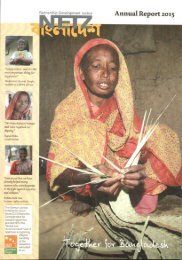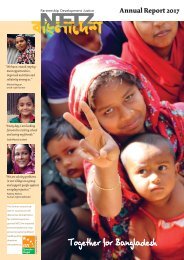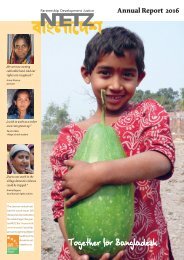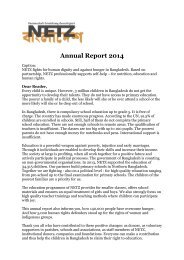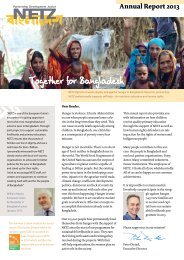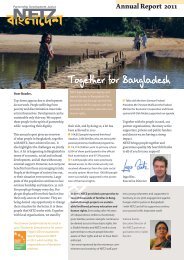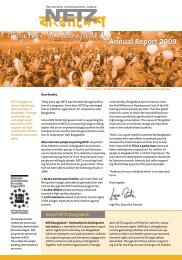NETZ Bangladesch Annual Report 2010
Create successful ePaper yourself
Turn your PDF publications into a flip-book with our unique Google optimized e-Paper software.
More than<br />
100,000 people<br />
in Bangladesh<br />
were able to overcome hunger with the<br />
support from Germany through the livelihood<br />
programme of <strong>NETZ</strong>. With the<br />
support of our partner organisations,<br />
women from the poorest families now<br />
design family development plans. They<br />
receive training as small-scale entrepreneurs and an initial<br />
capital, for instance, for cows, goats or seeds and leasing land<br />
for the cultivation of rice, fruits and vegetables. With the sales<br />
profit they can again buy livestock or take lease of new land.<br />
In this way, their standard of living changes fundamentally<br />
and definitely in a sustainable way. However, the programme<br />
changes much more than just enabling people to feed themselves<br />
and their families.<br />
Ossified power structures and conflicting political conditions<br />
as well as economical disadvantages create poverty and preserve<br />
it. If a tragedy occurs, poverty becomes life-threatening.<br />
Only when many affected people combine their efforts,<br />
change will be possible and the struggle against poverty will<br />
succeed sustainably. These changes are often invisible in the<br />
beginning as they progress in small steps. But little by little<br />
they change a society so that the poorest can get justice. That<br />
is why we initiate self help that sustains after the period of<br />
a project. Women organise themselves in the livelihood pro-<br />
gramme of <strong>NETZ</strong> independently and stand up for each other.<br />
‘We can make it too‘ – that is the translated name of the federation<br />
of women‘s groups in Darshana, in the western part of<br />
the country, where we have been cooperating with our partner<br />
Jagorani Chakra Foundation since 2002. Meanwhile, the federation<br />
consists of 5,670 members and more than 65 employees,<br />
who are financed from their own resources. The federation<br />
manages the savings of the members and is responsible<br />
for the awarding of small loans. They also look after 35 preschools,<br />
which were built up and maintained by the women.<br />
Three women already got elected into the local Union Parishad,<br />
i.e. Union Council, and advocate the rights of the poor.<br />
The children of these women<br />
will grow up in a changed situation<br />
as their mothers were<br />
fighting for their survival and<br />
rights.<br />
Manfred Krueger, Chairperson of<br />
<strong>NETZ</strong> Bangladesh; here together with<br />
Anzira Khartun, Chairperson of the<br />
women’s federation in Darshana.<br />
Photo: Peter Dietzel<br />
Programme 2: Primary education<br />
<strong>NETZ</strong> supports the poorest children<br />
In Bangladesh, about four million children<br />
between the age of six and ten are not in a<br />
position to go to school. More than half of all<br />
girls and boys do not complete their primary<br />
education. One can find manifold reasons<br />
why children from poor families do not continue<br />
or do not even enrol at school. Additionally,<br />
the quality of education in many<br />
formal primary schools is so poor that the<br />
children hardly learn anything.<br />
Photo: Lukas Jednicki<br />
<strong>NETZ</strong> was active in 346 primary schools in <strong>2010</strong>: 19,435 students<br />
learned how to read, write and do arithmetic in these<br />
schools. They were given the basic skills for a better future.<br />
Children in remote areas, such as the river islands in the major<br />
rivers in the north of the country and indigenous children, whose<br />
mother tongue is not spoken in primary schools, have less educational<br />
opportunities. <strong>NETZ</strong> ensures their fundamental right to<br />
education through the construction of 270 basic non-formal primary<br />
schools.<br />
Together for Bangladesh<br />
<strong>NETZ</strong> additionally supports 66 formal primary schools already<br />
existing in the project region:<br />
<strong>NETZ</strong> involves education support organisers in formal schools<br />
to reach out to especially disadvantaged children.<br />
<strong>NETZ</strong> strengthens and trains teachers so that they can design<br />
and carry out their lessons more efficiently.<br />
Parents’ and school committees are established and strengthened<br />
to voice a claim for an improvement in the quality of teaching<br />
lessons with the relevant authorities.<br />
3



